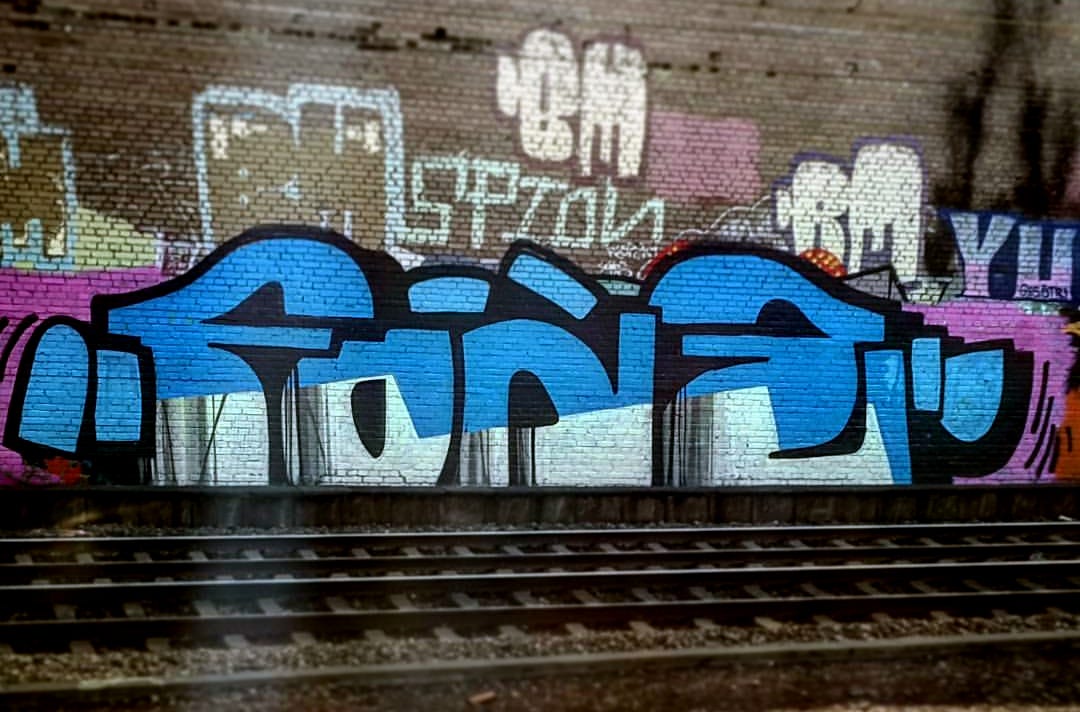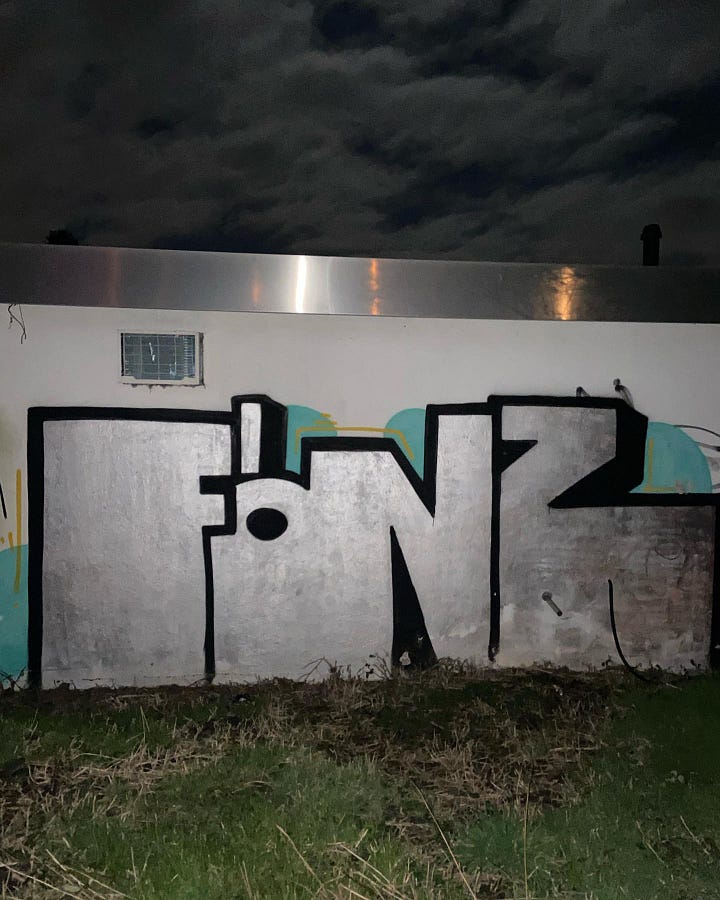Cool like The Fonz: 5 tracks + 5 facts I learned from The (real) Fonz’s memoir
PLUS: Graff writer THE FÖNS of Düsseldorf
It was September 1973. From 210 W. 78th Street, #10a, you would’ve taken the M1 Harlem-East Village line all along Broadway, then the Bronx 3 for a couple stops to get to 1520 Sedgwick Ave, where Kool Herc’s gatherings were gaining momentum. Across the country, a 27-year-old theater actor who’d grown up in that Upper West Side apartment touched down in LA. If you want to be known in New York, stay in New York, he’d been told, but if you want to be known to the world, go to California. He went, and (spoiler alert) six weeks later, on October 30th, he got the part of The Fonz on Happy Days. 2023 marked fifty years of Hollywood success for Henry Winkler. In his memoir, Being Henry: The Fonz and Beyond1, he tells how he overcame major obstacles during those five decades.

Reading and writing is a challenge.
Remember the episode where The Fonz takes Richie to the library to meet college girls and Fonzie gets his first library card? In real life, Henry Winkler couldn’t read or write. He started reading books at age thirty-one. He still has to read slowly, and to this day he can’t spell. He keeps the word ‘schedule’ on a piece of paper over his desk—he can’t sound it out but has to use the word a lot. It’s one strategy he uses to compensate for severe dyslexia, a language-based learning disability that affects about ten percent of people in the world. It wasn’t until the middle of his decade-long run playing the greaser-gangster-turned-friendly-fixer that he realized he had it. He finally had a name for this thing that had plagued him his entire life.
His parents, who’d fled Berlin during the Nazi regime, called him dummer hund as a child: that’s dumb dog in German. They yelled a lot. He was grounded a lot. But it wasn’t just his parents coming at him. He felt disapproved of by nearly all his teachers. Assigned books in school, he read only the cover and then splashed water on the pages, letting them dry over the weekend to make it look like he’d put in a lot of time reading. He attended summer school again and again. He got kicked out of a few activities. When it came time to graduate and apply to college, he was in the bottom three percent academically in the US. All of it pummeled his confidence. I could relate; my lack of focus got me in a lot of hot water. But there was one teacher who told him that if he got it together, he would do great things.
“How you learn, and how difficult it is, has nothing to do with how brilliant you are.” — Henry Winkler
I was fascinated reading how even with these challenges he went on to ace auditions. He would request scripts ahead of time and read one. word. at. a. time—using a yellow highlighter, reading it again and again. Then during the audition, unable to recall everything, he would improvise, giving “the essence” of the character, he would tell them. And it kept him working. Survival tactics like these helped him parlay acting into other careers and navigate business and personal relationships. Tenacity is one of the words he lives by.
He conquered self-doubt.
The Fonz by Wiki (prod. Subjxct 5), 2022 Wikset Enterprise
Henry Winkler says he’s prone to anxiety. As a kid, he never understood exactly what happened when he would walk into the room and his parents laid into him in heavy German accents…for not being an extension of who they were. They refused to see his struggles. He embarrassed them. The shock caused him to bury himself in thick cement. A thick cement of bad ideas others had laid on him and which he’d begun to believe, too. He lost himself—for decades.
The actor says he can talk himself out of almost anything. While deliberating the move to LA in his twenties, excuses came easy: wasn’t tall, didn’t have the star quality to make it (despite having done The Lords of Flatbush and lots of commercials, like Sanka2). Are you crazy, he would say to himself, you can’t do that. After so long going around and around in his mind, he finally gets sick of it and tells himself to just shut up, jump off the precipice, and fly. That’s how I get there too sometimes. A thousand bucks in his pocket, he gave himself a month. A week after arriving, he got a guest spot on The Mary Tyler Moore Show. I watched it on YouTube and could see why Garry Marshall would audition him for Happy Days.
Ambivalence will take a person down, the actor says. If someone wants to give an idea life in the universe, ambivalence will crush that. He learned the hard way when instead of going with his gut and directing a play he really wanted, he was dazzled by a directing offer from Disney doing Turner and Hooch. He was canned midway through.
He expresses that he learns by listening. The ear is the center of all relationships, he says. But he couldn’t always do it. Acting opposite well-known stars, he’d be so focused on the sense of awe that he wouldn’t truly listen to what they were saying. He later learned to abide by the mantra Relaxation-Concentration: relax, and concentration inevitably follows. Once he mastered listening, his acting improved—he could be in the moment and create more meaningful dialogue. He also learned he didn’t have to know everything to be a director—he learned things from the actors and the crew. Listening improved his personal relationships, too. He would hear his kids out—he believes that a kid who is heard is powerful.

Throughout the book he describes how listening to music helped him. Music helped him cope with his parents' anger and his own unexpressed feelings. It helped him memorize lines. To deal with the near-instant fame that came later, he’d smoke a joint, listen to records he’d bought from Tower, and read fan mail in his West Hollywood apartment.
But even though he could feel all the accolades and warmth people directed at him, until recently he couldn’t imagine that they were speaking of him. It was always clear in his mind that he was second rate. He later taught himself not to finish those defeatist sentences, because sentences become paragraphs and then entire stories. A negative thought enters his mind, and he releases it before he puts a period on the end. He replaces the ending with something positive or says aloud that he doesn’t have the time.
“I absolutely knew I couldn’t do it—until I just tried,” he’s said3. Between gigs once, his attorney said he was going to start a production company for Henry. Winkler protested—he couldn’t possibly do it because of the dyslexia. The attorney’s advice: There are people who know what you don’t know, and you do what you know. He did it—and sold the TV series MacGyver. He knew nothing about writing books. He knew nothing about baseball or fly fishing or photography. But he tried and learned those things, too. I recalled how my dad would always tell me to ‘just do the best you can’. And Winkler—just like my dad—emphasizes that you don’t have to be perfect at something for it to be legit.
Cool like The Fonz: He found his own voice.
Sticky Icky & Guns by Vic Spencer feat. Sonnyjim (prod. Sonnyjim), 2021 Daupe!
Winkler describes his struggles to be authentic in his everyday life—the cemented-in 10-year-old boy kept getting in the way of relationships with his wife, his kids, business partners. He felt like a child with the keys to the car. But acting was a different story. He could go with his instincts.
‘Whoa’ and ‘ayyy’ became synonymous with cool, thanks to The Fonz. You can’t say a lot and be cool, Winkler has joked. But there’s some truth to it that makes me vow to become a more ruthless editor. He perceived Henry Winkler as the polar opposite of The Fonz and had next to no confidence in most anything he did, until only recently. On stage or auditioning was different though—something happened. The memoir opens with his Happy Days audition, using the only reliable technique: improvisation. Though he couldn’t read the script, an authoritative, rough-edged, deeper voice came out of nowhere. With an ‘Ayyy,’ he told his audition partner what’s what in a few commanding phrases, threw the script up in the air, and sauntered out of the casting room.
When offered roles, coolness never superseded the writing for Winkler—he’s said it’s the written word that makes or breaks the project4. When he received the call on October 30th, 1973 offering the Fonz role, he accepted on the condition that he’d get to show the emotional side—who the character was after he took off the leather jacket at the end of the day. He says in everyday life his nerves have often gotten the best of him, but when it comes to his work, he asks for what he wants. He also says you have to abandon yourself completely when acting. I think that can apply to other art forms, too.
“I’m starting to think that I should get more personal, but I’m too scared to write down the things that hurt the most.” — Fonz-E-Mak, The Storm Before the Calm
He learned not to abandon himself in business. His reputation as the nicest guy in Hollywood holds up in the book. No big ego. But he doesn’t mince words about his wack production company partner, describing the relationship as showing up each day and having to reintroduce himself to the guy—no warmth and no continuum. The assertiveness that had served him in acting allowed him to stand up and sever unsavory ties.
Later, through talk therapy, he learned that he’d allowed the 10-year-old boy to take up too much space inside. The 10-year-old that had always chased the cool kids. The 10-year-old that kept Scorsese and Ford Coppola phones on his desk, waiting for a call. Winkler finally realized that he had to find a way to exorcize the little kid yet keep him around for his acting work.


Early on during Happy Days, Henry Winkler and Ron Howard spotted Robert De Niro leaning up against a wall on the Paramount lot, dressed in 1920s clothes—he’s working on The Godfather Part II—and Winkler has to say hello. They walk up and introduce themselves, De Niro acknowledges them with a ‘How you doin’,’ and Winkler says, “I just want to tell you before we leave you … you use the word f**k better than anybody on the planet in Mean Streets.” Four decades later, he again ran into De Niro who gave him a warm half-smile and said, “You said I use the word f**k better than anybody on the planet”. Words matter.
And so it is with lyrics. But so, too, with the overall sound of a track—how does it leave me. The mood Erick the Architect created in 36 Chamber Flow by Flatbush Zombies is instant nostalgia, with some grit. The beat, keys, cadence, voice quality and intonation—they stick with me, even outsize the lyrics. Like how Henry Winkler gave the essence of characters he auditioned for. Listen:
36 Chamber Flow by Flatbush Zombies (prod. Erick the Architect), 2016 Fool's Gold Records
He broke out of the matrix.
During the Happy Days run, almost everyone we knew would watch on Tuesday nights at 8:00. Thirty million viewers tuned in to watch the series finale5. I wasn’t surprised reading that Henry Winkler got over fifty thousand fan letters a week during the show. In her book Fame: The Hijacking of Reality, actor and filmmaker Justine Bateman shared her experience during that pre-cable era when we were all huddled around the TV on the same night, watching the same shows, talking about them throughout the week, and sending fan letters through the mail. Most shows today, the book suggests, might have a small fraction of pre-cable and internet viewership. Attention is spread thin with gobs of streaming content. We know the same holds true for the music industry. I’m thankful for the shows and programs that allow me to huddle and listen and share with others about what we’ve heard.
Other than seeing Night Shift (1982, dir. Ron Howard) a few years back, I’ve only known Henry Winkler as The Fonz. When Howard offered him either lead role in the film, he chose the ‘Richie Cunningham character’. People loved him in the tough greaser role, but he intended to beat typecasting. He shares how he’d made it a point throughout Happy Days to be Henry when he would encounter fans, who often wanted him to be in character or tell them the secret to being cool.

The memoir illustrates his journey from being who he thought he should be—who others wanted him to be—to being exactly who he is. Despite almost failing high school and applying to twenty-eight colleges, getting just one acceptance letter—to Emerson—his acting chops got him into the Yale School of Drama. He felt pressure from classmates to not do television but went his own way. His parents looked down on his choice to become an actor and wanted him to take over Harry Winkler’s business selling wood. Despite their judgment, too, he held his ground. And because of the freedom acting gave him, he endured the humiliation and embarrassment of not being as fluent as his castmates during table reads. The naysayers came back around once he achieved fame.
“I'm cool, the top gun, but NOT The Fonz …” — Black Milk, The Matrix
He paired a sense of flexibility with his tenacity of steel, and opportunities came, decade after decade. He got to star in a Neil Simon play, The Dinner Party, on Broadway with beloved actor John Ritter for a nine-month run. Winkler relayed this cool observation on theater acting: Once a play ends you might take a break and then come back and do the role again, only to find that the character has grown in you because of all that you’ve experienced in the meantime. I thought about how that can be true in writing, music, and other artforms, too. Winkler adopted new ways of thinking and learned not to box himself in or tell himself he can’t do something. He learned to listen to his gut and follow that.
The Matrix by Black Milk feat. Pharoahe Monch, Sean Price & DJ Premier, 2008 Fat Beats Records
He mastered the waiting game.
So he’d jumped off the precipice and flown higher than he’d imagined. He thought he would go from mountaintop to mountaintop after Happy Days ended, but the reality was that he spent time in valleys, waiting. And it fed his anxiety, especially over finances. He waited for his agent to call with auditions. So many times there were none, or he’d get something and it didn’t pan out. He waited for the Scorsese and Ford Coppola phones on his desk to ring, but the phones gathered dust. All throughout his career there were times he had to just wait.
With the help of a cowriter, he became a children’s book author while he waited. He didn’t always know what he would write during the next session, but the ideas kept coming. He’s now written dozens of books. US TV execs rejected the proposal of a show based on the books—about a kid named Hank Zipzer who navigates life with dyslexia—on the grounds it wasn’t aspirational, like Hannah Montana. The Brits embraced it and turned it into a popular 39-episode series.
He waited, and to fill time he started a production company. He waited, and learned to direct films. He waited, and got 32 episodes playing Barry Zuckerkorn on Arrested Development. He waited, and at 72 landed the role of Gene Cousineau on the series Barry. He won a primetime Emmy for it. He says the Emmy didn’t convince him he was better than other actors, but it told him he was as good.
I thought about how Winkler was denied a simple fate. Not only because of the dyslexia, but because he was called to a career in the arts. I thought about ways I, and my dad, too, was denied a simple fate. I thought about times when I ignored my inner voice and didn’t wait, acting compulsively just to make something happen. Or times when I waited for something to happen and didn’t take any action. But sometimes being denied a simple fate—the challenges, the self-knowledge, the resilience, the having to wait—leads to great things. Besides tenacity, gratitude is the other word Henry Winkler lives by.
Don’t touch the volume. Listen to how Sani’s Muzak effect6 and Fonz-E-Mak’s lyricism and spoken words brilliantly illustrate the notion of waiting in The Storm After the Calm:
The Storm After the Calm by Fonz-E-Mak (prod. Sani), 2011 2008ighties/ Brkf$t Club
Reading his own memoir, the journey back to himself became clearer to Henry Winkler. The guy who left New York with a thousand bucks and a dream proved invincible. Being your authentic self is cool and magnetic, he says—when you know yourself, you know others, too.
A very special thanks to all the artists in this issue.
RIP, Marvin Gaye, Garry Marshall, Sean Price, and John Ritter.
This month’s UNDERSCORE: A meditation with DJ Kool Herc
Live at the T Connection Part 1 by DJ Kool Herc & The Herculords, 1981
Winkler, Henry. Being Henry: The Fonz and Beyond. Celadon Books, 31 Oct. 2023.
“Sanka (Henry Winkler) :60.” n.d. Www.youtube.com.
Chicago Humanities Festival. “Being Henry Winkler.” Www.youtube.com, 18 Jan. 2024, youtu.be/0Fy4cxKmHwk?si=GmFXN2ZcwWBF0HoY.
PBS. “Henry Winkler Reflects on Life with Dyslexia and His Journey of Self-Discovery.” Www.youtube.com, 19 Nov. 2023, youtu.be/kDeembAPKIo?si=fSixlDHVkL0eVIhf.
Nededog, Jethro. “The 20 Most-Watched TV Show Finales of All Time, Ranked.” Business Insider, 16 May 2017, www.businessinsider.com/most-watched-tv-show-finales-of-all-time-2017-5.
Gaye, Marvin. “Don’t Mess with Mister “T.”” Www.youtube.com, 1 Jan. 1972, youtu.be/lyPn4WfW9sI?si=Y8XLliMCoW6l9ZY3.



